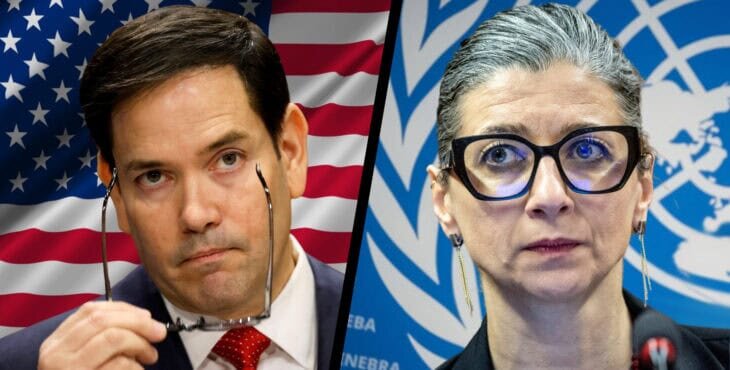US move against UN Gaza investigator comes as a shock

TEHRAN - The United States' decision to impose sanctions on Francesca Albanese, the UN Special Rapporteur on the situation of human rights in the Occupied Palestinian Territory, has ignited a global outcry and intensified debates over international justice, the independence of UN mechanisms, and the limits of state power.
Announced by Secretary of State Marco Rubio on July 9, the sanctions mark an unprecedented punitive measure against a senior UN official for her investigations and outspoken criticism of Israel’s military actions in Gaza.
Ridiculous accusations
Francesca Albanese, an Italian human rights lawyer, has been a vocal critic of Israel’s 21-month military campaign in Gaza, which she has characterized as “genocide” and a violation of international law. In her recent report to the UN Human Rights Council, she named over 60 companies—including major US firms—as complicit in supporting Israel’s military operations and occupation. Albanese has called for investigations and prosecutions by the International Criminal Court (ICC) of Israeli and US officials and business leaders involved.
The Trump administration justified the sanctions by citing a February 2025 executive order accusing Albanese of engaging in “biased and malicious activities,” “unabashed antisemitism,” and “support for terrorism.”
It further alleged she sent “threatening letters” to US companies, urging ICC prosecutions—claims Albanese and her supporters have strongly denied. The sanctions bar Albanese from entering the US and freeze any assets she or her family may hold in the country. This move follows earlier US sanctions on ICC officials after the court issued arrest warrants for Israeli Prime Minister Benjamin Netanyahu and his war minister Yoav Gallant.
Global reactions
The United Nations leadership swiftly condemned the sanctions. UN spokesperson Stephane Dujarric called them “unacceptable,” warning they set a “dangerous precedent” that undermines the independence of UN experts. Jurg Lauber, president of the UN Human Rights Council, emphasized the essential role of special rapporteurs and urged all states to avoid intimidation or reprisals. The Special Procedures Coordination Committee denounced the US action as an attack on the UN’s core values.
Human Rights Watch and Amnesty International described the sanctions as an attempt to “silence a UN expert for doing her job,” warning that such measures threaten the international system of accountability for serious abuses. Civil society groups worldwide rallied in support of Albanese, cautioning that this move could chill advocacy for Palestinian rights and justice.
Switzerland, through its UN ambassador Jürg Lauber, called for restraint and respect for the independence of UN experts. Other governments expressed concern about the precedent set by the US, fearing it could erode international human rights protections.
Tehran’s response has been particularly forceful. Iranian Foreign Ministry spokesperson Esmaeil Baghaei condemned the sanctions as an attempt to “suppress truth by sanctions.” He highlighted the stark contrast between Albanese’s treatment and the warm reception Israeli Prime Minister Netanyahu received in Washington despite ICC arrest warrants. Baghaei described the US action as “mafia intimidation techniques” and blatant hypocrisy, underscoring Iran’s view of Western double standards.
Francesca Albanese’s response
Albanese defiantly rejected the sanctions, calling them “obscene” and reminiscent of “mafia intimidation techniques.” She asserted that the sanctions would not deter her "quest for respect for justice and international law" and urged the international community to "stand together" against action to silence human rights defenders. In interviews she reaffirmed that she was committed to exposing the serious violations and holding all those who committed those violations accountable, regardless of political pressure.
Nobel peace prize nomination
Francesca Albanese has been officially nominated for the 2025 Nobel Peace Prize by Aodhan O Riordain, a member of the European Parliament, along with colleagues, in recognition of her courageous work exposing human rights abuses and advocating for peace and justice, particularly in Palestine. Supported by multiple petitions, her nomination highlights her fearless dedication to human rights and embodiment of Nobel values such as courage, dignity, and conflict resolution. Despite facing political opposition and US sanctions accusing her of bias and terrorism support—claims widely dismissed by human rights groups—Albanese remains resolute. Her reports condemn actions in Gaza as genocide and call for an immediate ceasefire.
The Nobel Peace Prize will be announced on October 10, 2025, with public endorsements raising awareness of her significant role in international human rights.
A critical turning point
The sanctions on Albanese raise serious concerns about the weaponization of unilateral measures to silence dissent. By targeting a UN expert for her mandated work, the US risks legitimizing similar actions by arrogant countries.
The timing, coinciding with Netanyahu’s visit to Washington, suggests a strategic alignment with Israel’s interests, particularly as it faces ICC arrest warrants for its leaders. The lack of transparency about the sanctions’ scope and the reliance on vague accusations of “antisemitism” further erode their legitimacy.
Moreover, the US move contradicts its stated commitment to a rules-based international order. By punishing Albanese for engaging with the ICC, the US undermines the court’s independence and the broader framework of international justice.
This aligns with a pattern of selective human rights enforcement, where violations by allies like Israel are shielded, while dissenting voices are suppressed. The sanctions also distract from the substantive issues raised in Albanese’s reports, such as corporate complicity in occupation and the humanitarian crisis in Gaza, which demand urgent attention.
The move risks undermining the UN’s human rights mechanisms and emboldening other states to target independent experts. As the international community grapples with the Gaza conflict’s toll, the focus should shift from silencing critics to addressing the root causes of violence and ensuring accountability for all parties.
As the international community grapples with Israel’s gruesome crimes in Gaza, the focus should shift from silencing critics to bringing the Gaza war criminals to justice.
Leave a Comment